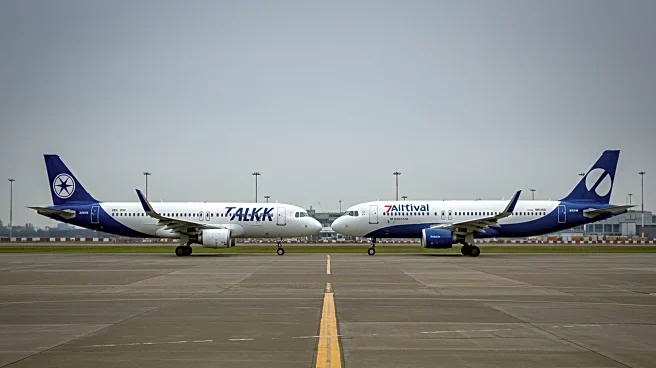What's Happening?
The U.S. Department of Transportation (DOT) has withdrawn its approval of the joint venture between Delta Air Lines and Aeromexico, citing issues related to the U.S.-Mexico air transport agreement. This decision comes amid a broader political dispute between the U.S. and Mexican governments, particularly concerning operating slots at Mexico City's Benito Juarez International Airport. The DOT's actions include imposing new restrictions on Mexican airlines operating in the U.S. and requiring them to submit lists of their U.S. flights. Delta and Aeromexico have argued that their partnership benefits consumers by providing convenient service and lower fares, and they have urged the DOT to reconsider its decision. The withdrawal of antitrust immunity for the joint venture could lead to the cancellation of up to two dozen routes between the U.S. and Mexico, with smaller aircraft replacing larger ones on many routes.
Why It's Important?
The DOT's decision to withdraw approval of the Delta-Aeromexico joint venture has significant implications for the airline industry and consumers. The move is part of a larger effort to ensure fair competition in international aviation markets, as stated by American Airlines, which supports the DOT's actions. The unraveling of the joint venture could disrupt travel plans for passengers on affected routes and potentially increase fares due to reduced competition. Additionally, the decision highlights ongoing tensions between the U.S. and Mexican governments over aviation agreements and airport operations, which could impact future airline partnerships and market dynamics.
What's Next?
Delta and Aeromexico are pushing back against the DOT's decision, arguing that it harms consumers and the airlines rather than addressing issues with the Mexican government. Meanwhile, Allegiant Air and Viva Aerobus are seeking DOT approval for their own joint business, emphasizing the lack of competition in the Mexican air travel market. The outcome of these disputes and applications will likely shape the future of U.S.-Mexico airline partnerships and influence regulatory approaches to international aviation agreements.









